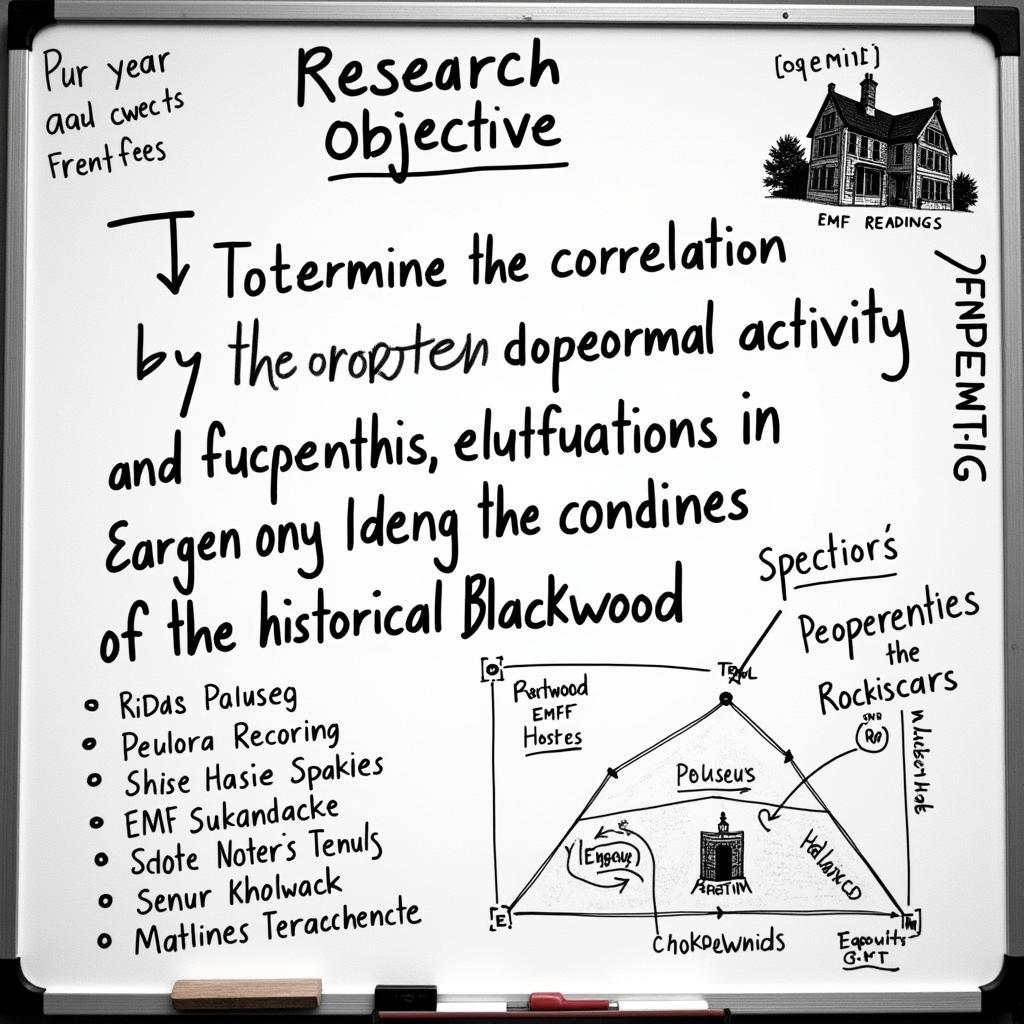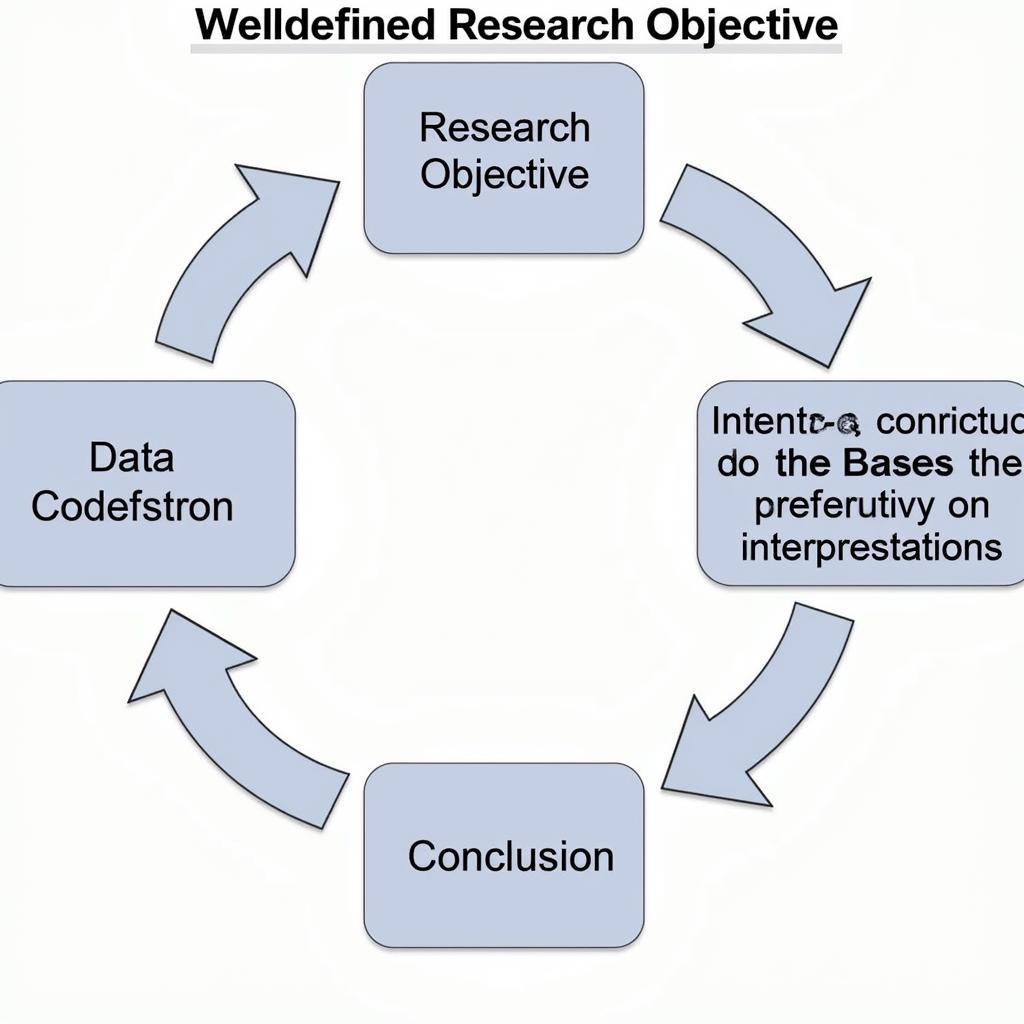A Research Objective Should Specify the intended outcome of your research. It’s the “what” you hope to achieve, a clear and concise statement that guides your investigation. Understanding how to properly define your research objective is crucial for a successful project, whether you’re exploring the existence of Bigfoot or analyzing historical accounts of poltergeist activity. Defining your objective early on provides a roadmap for your research, ensuring your efforts are focused and productive. It’s like setting coordinates on a paranormal investigation – without them, you’re just wandering in the dark.
What exactly should a research objective specify? It should pinpoint the information you aim to gather, the questions you want answered, and the insights you hope to uncover. A well-defined objective provides direction, enabling you to design your methodology, collect relevant data, and draw meaningful conclusions. Without a precise objective, you risk wasting valuable time and resources. Just like a ghost hunter needs a specific location to investigate, a researcher needs a specific objective to guide their inquiry. This ensures the investigation stays on track and doesn’t veer into unrelated territories. For instance, if your research term involves investigating EVP phenomena, your objective might be to determine the frequency and clarity of EVP recordings in specific haunted locations.
Defining Your Research Objective: Key Considerations
A strong research objective is the foundation of any successful investigation, particularly in the field of paranormal research. It serves as the compass directing your exploration, ensuring that your efforts remain focused and lead to meaningful discoveries. So, what are the key considerations when defining your research objective?
Specificity is Paramount
Your objective must be laser-focused, clearly stating what you intend to achieve. Vague or ambiguous objectives lead to diffuse research efforts and ultimately inconclusive results. For example, instead of stating “Investigate paranormal activity,” a more specific objective would be “To analyze the correlation between electromagnetic fluctuations and reported apparitions in a specific historical building.” This clarity of purpose ensures that your efforts are targeted and your findings are relevant.
Measurability Matters
A good research objective is measurable, allowing you to track your progress and evaluate your findings. This means defining quantifiable outcomes that can be observed and analyzed. If your research involves EVP analysis, you could aim to collect a certain number of Class A EVP recordings within a specified timeframe. This allows you to objectively assess your progress and draw data-driven conclusions.
Achievability is Essential
While ambition is important, your objective must be realistic and attainable within the confines of your resources and timeframe. Setting an objective to definitively prove the existence of ghosts within a single research project is likely too broad and unachievable. A more realistic approach would be to investigate specific instances of reported paranormal activity and analyze the available evidence.
Relevance is Key
Your research objective should be relevant to the broader field of Paranormal Research and contribute to the existing body of knowledge. It should address a gap in current understanding or explore a new perspective on a particular phenomenon. This ensures that your work has value and contributes to the ongoing conversation within the paranormal community.
 Specifying Research Objectives in Paranormal Research
Specifying Research Objectives in Paranormal Research
How to Formulate a Strong Research Objective
Formulating a robust research objective requires careful thought and planning. It’s not just about picking a topic and diving in; it’s about defining a clear path for your investigation.
- Start with a Question: Begin by identifying the specific questions you want to answer. What are you curious about? What puzzles you about a particular paranormal phenomenon? Framing your objective as a question helps focus your efforts and ensures your research directly addresses your area of interest.
- Refine and Focus: Once you have a general question, refine it to make it more specific and measurable. Instead of “Do ghosts exist?”, consider “What evidence supports the existence of paranormal activity in a specific location?”
- Use Action Verbs: Use strong action verbs to describe what you intend to do. Words like “analyze,” “investigate,” “compare,” and “evaluate” convey a sense of purpose and direction.
- Consider Your Resources: Ensure your objective is achievable within the constraints of your time, budget, and available resources. It’s important to be realistic and set achievable goals.
 Example of a Research Objective in a Paranormal Study
Example of a Research Objective in a Paranormal Study
Common Mistakes to Avoid
When defining your research objective, be aware of these common pitfalls:
- Being Too Broad: Avoid overly general objectives that lack focus. Specificity is essential for effective research.
- Lack of Measurability: Ensure your objective can be measured and assessed. This allows you to track progress and draw meaningful conclusions.
- Unrealistic Expectations: Set achievable goals within your available resources and timeframe. Avoid overambitious objectives that are unlikely to be met.
- Ignoring Existing Research: Review the research purpose statement and existing literature to ensure your objective is relevant and contributes to the field.
- Failing to Clearly Define Terms: Ensure all terms and concepts used in your objective are clearly defined to avoid ambiguity and misinterpretation.
Dr. Evelyn Blackwood, a leading researcher in parapsychology, emphasizes, “A well-defined research objective is the cornerstone of any credible paranormal investigation. It provides the framework for collecting data, analyzing findings, and ultimately, contributing to our understanding of these elusive phenomena.”
Applying Research Objectives to Real-World Paranormal Investigations
Imagine you’re investigating a haunted house with reports of disembodied voices. A poorly defined objective might be “Investigate the house for ghosts.” A well-defined objective would be “To record and analyze auditory phenomena within the house using digital recorders and spectral analysis software, aiming to identify patterns, sources, and potential explanations for the reported voices.” This targeted approach increases the likelihood of meaningful results.
Professor Arthur Vance, a renowned expert in anomalous phenomena, adds, “Specificity in research objectives is paramount, especially in the realm of the paranormal. A vague objective is like trying to navigate a dark forest without a map – you’re likely to get lost and find nothing of value.” Knowing how to put undergraduate research on resume is very important.
 A Well-Defined Research Objective in Paranormal Research
A Well-Defined Research Objective in Paranormal Research
Conclusion
A research objective should specify the exact outcome you aim to achieve. It provides the guiding principle for your research, ensuring your efforts are focused and your findings are relevant. By following the guidelines outlined in this article and considering the delimitations in research, including example research questions for quantitative research, you can develop strong research objectives that will contribute to a deeper understanding of the paranormal world.
FAQ
- What is the difference between a research objective and a research question?
- How do I ensure my research objective is measurable?
- Can I have multiple research objectives in a single study?
- What are some common mistakes to avoid when formulating research objectives?
- How do I refine a broad research question into a specific objective?
- What role does the research objective play in the overall research process?
- How can I ensure my research objective aligns with my available resources?
Need more help with your research? Contact us! Phone: 0904826292, Email: research@gmail.com or visit us at No. 31, Alley 142/7, P. Phú Viên, Bồ Đề, Long Biên, Hà Nội, Việt Nam. We have a 24/7 customer support team.